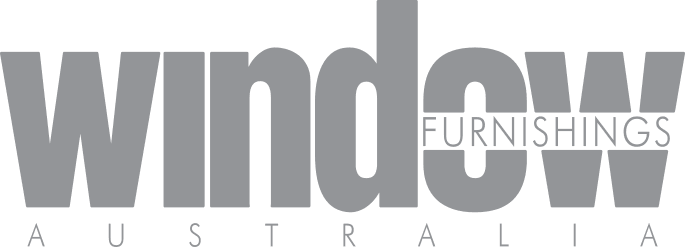
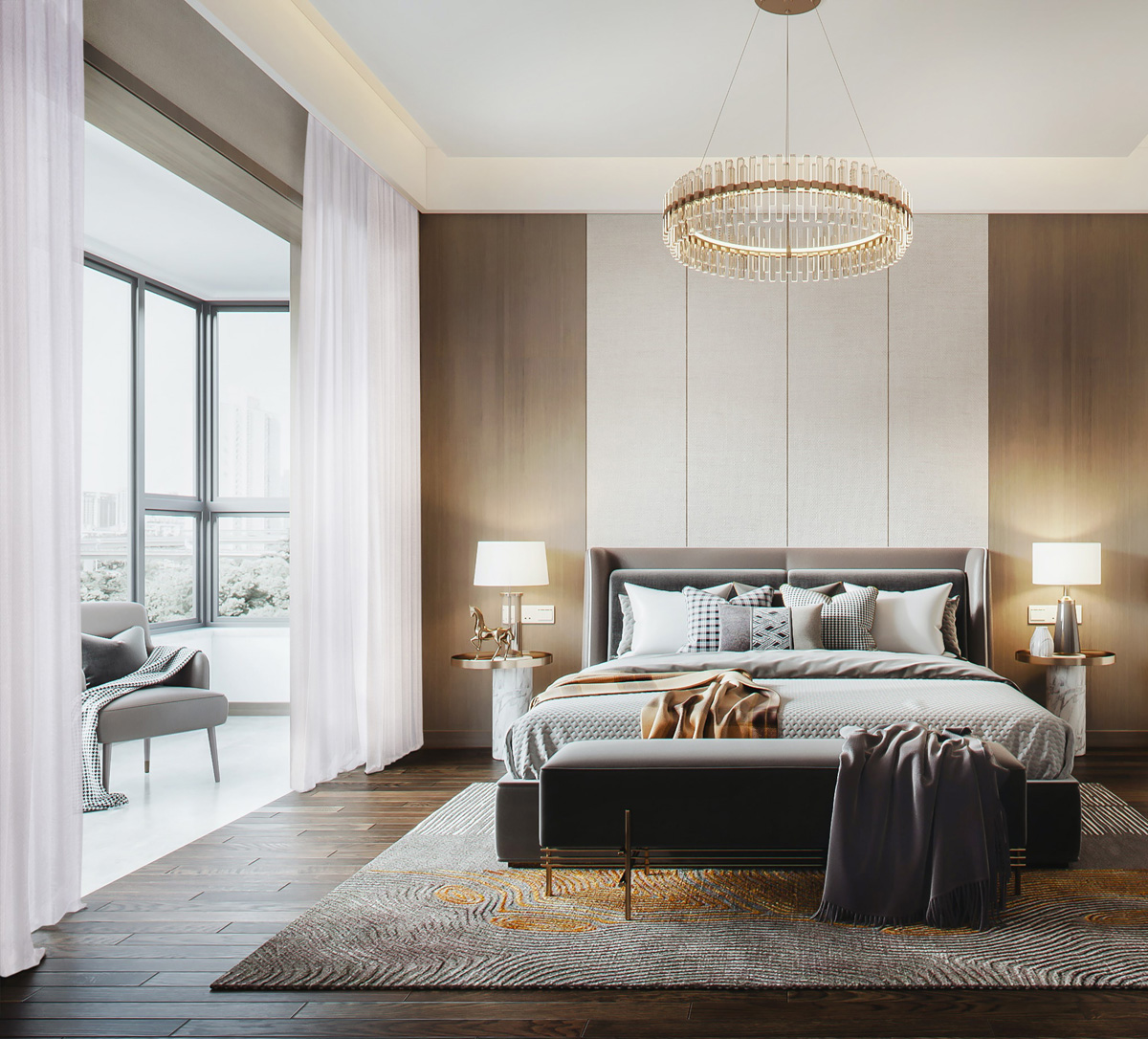
Australian manufacturers encountered both challenges and opportunities since the COVID-19 pandemic broke out in 2020, but amid the ensuing structural change, there is a sense that the opportunities are winning.
Wilson Fabrics
“Wilson Fabrics is Australia’s largest soft furnishing wholesaler, specialising in high-end fabrics for custom made drapery and blind applications to retailers. Established in 1926, we have history on our side, Wilson Fabrics is proudly Australian Made and owned to this day,” says Peta Fitzgibbon, General Manager.
“Having our own fully vertically integrated mill in Wangaratta, Victoria gives us total control over the entire production process path. This is the key driving force behind our ability to consistently and reliably deliver our products our customers depend on.”
“Being an Australian Made Licensee represents trust, quality, reliability and supports local jobs, all values we take very seriously and align with everything we stand for. It also comes with the responsibility to meet higher standards to ensure we remain competitive on value rather than price. We have seen a significant surge in demand for Australian Made products during and post the pandemic and we are very proud to be in the position to service these market demands.”
A passion and dedication to produce high-end quality fabrics is in the company’s DNA “and is represented across every facet of our business,” she says.
The company is continually looking for ways to improve efficiencies: R&D, Energy & Solar and ongoing investments in state-of-the-art machinery; dyeing machine, new looms, upgrades to existing machinery and a 1MW Solar Panel investment totalling $4.5 million.
“Constantly evaluating our processes and implementing more economically viable practices minimises waste, maximises productivity and throughput and contributes toward our sustainability goal by reducing our carbon footprint.”
Fitzgibbon confirms the company’s collections are designed and inspired by the Australian landscape. Along with its established classics like Broome & Boston, newer collections also have a co-ordinating blind, drapery and sheer story in the form of the Uluru, Ayres and Whitsundays, or Daintree, Palm Cove, Whitsundays stories.
“What’s special about Whitsundays? Apart from being a timeless sheer with superb drapeability, it has been developed with our unique Colour Flow concept to co-ordinate with our existing drapery and blinds, giving our customers a ‘one stop shop’ complete window solution.”
Ziptrak
Ziptrak General Manager Ditmar Guehrer confirms Ziptrak blinds are Australian Made with the majority of the componentry manufactured in South Australia.
“We are located in the heart of the Tonsley Innovation District, where high-value manufacturing, research, training, and a culture of innovation are combined to facilitate taking new ideas from concept to market.
“The Ziptrak custom-made facility contains dedicated prototyping, research, and development areas, along with our manufacturing, distribution, and warehousing space. Genuine Ziptrak stands for quality, innovation and Australian Made and is the original, genuine and patented track-guided blind system.”
“Ziptrak is positioned as a market leading track-guided blind system with the smoothest specifically engineered spline system available, ensuring blinds glide effortlessly whether manually operated by our Australian Made SuperSpring system or motorised, whilst retaining cross blind tautness. The unique design of our outdoor system ensures Ziptrak outdoor blinds continue to operate seamlessly in the harshest conditions, adding value and comfort to people’s living environments.”
“During COVID-19, like most of the Australian blind industry, the Ziptrak business has been fortunate to experience significant growth due to unprecedented demand from both Australian and international markets. In late 2021, Ziptrak moved into a purpose-built 3,500 square-metre facility, enabling the on-site hosting of our R & D, manufacturing, assembly, distribution, and office spaces, but most importantly driving delivery efficiencies to the benefit of the entire Ziptrak network, and ultimately, the retail and business consumer.”
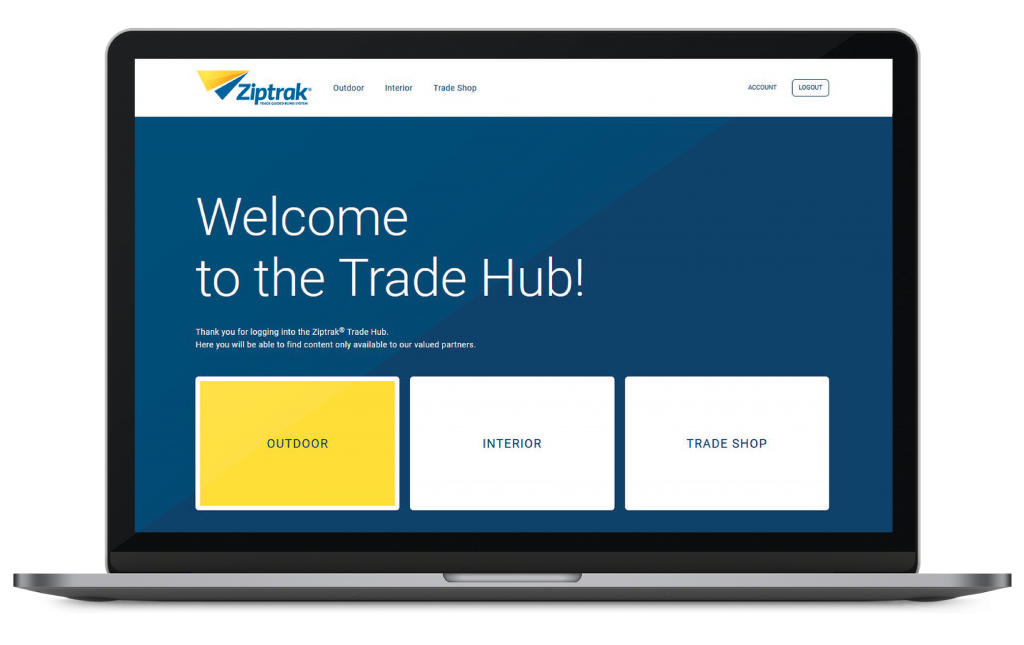
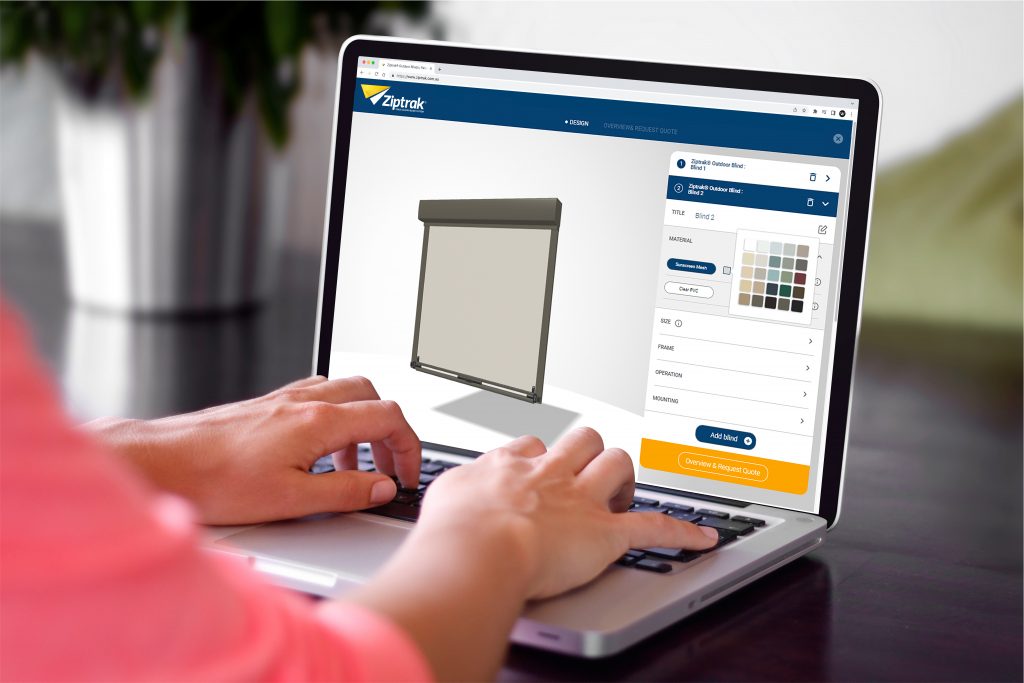
He indicates that the pandemic increased demand for locally manufactured window furnishings.
“Certainly, the shortage of imported products and shipping restrictions has affected the way people perceived local products. Years before the pandemic, Ziptrak took the step of returning production to Australia moving the SuperSpring system production in-house. We continue to work with local Australian suppliers to secure the best quality and timely supply of products to enable Ziptrak to react to market changes, whilst securing Australian engineering and manufacturing jobs.
“In the second half of 2020 and throughout 2021, we had an influx of online enquiries and customer orders at unprecedented levels. Whilst this pressured our usual supply times, we are pleased that we managed to provide the Ziptrak network with products throughout the unprecedented demand period, enabling the Ziptrak network to meet consumer demand.
“During the pandemic period, we launched the digital web-based app ‘Ziptrak Design Your Blind’ which has shown immense interest from consumers clocking up thousands of views and high-quality leads which are sent directly to Ziptrak retailers across Australia.”
“We are building and continually upgrading our manufacturing capabilities to meet strong demand. We have significantly expanded the Ziptrak engineering team, enabling us to focus not only on product design and manufacture but also on improved manufacturing opportunities.
“Notwithstanding the prevailing economic conditions, labour shortage, and the potential uncertainty of the market both locally and internationally, we remain confident in the products we manufacture, and the services and support we provide to the Ziptrak network, as well as the Ziptrak network’s quality and ability to meet the market requirements and adapt as needed.
Recruitment is a challenge at the moment. “Over the past few years, Ziptrak has been able to build a strong and established team and so recruitment for Ziptrak itself is no more difficult than normal, however, we are acutely aware of the recruitment challenges the Ziptrak Network continues to face.
“That is why Ziptrak continues to invest in providing the Ziptrak Network with support systems and processes specifically designed to assist, where we can, in the recruitment and initial and ongoing training of people within the Ziptrak Network.
“The Ziptrak Trade Hub is a fantastic resource for all things related to Ziptrak including Training resources, Technical details for our products, Marketing assets and the source of Ziptrak News for the Ziptrak Network.
“The latest product and training information is available 24/7 from the Ziptrak Trade Hub. This custom-made online platform was specifically designed for our trade customers and contains all there is to know about Ziptrak Blinds. Retailers and Fabricators can find technical documents, manuals, and videos as well as useful sales and marketing resources.
“In addition to an online platform and since the borders opened, the Ziptrak team has travelled around the country providing training to local fabricators, retailers, and installers. Within Ziptrak training and information sessions, the team covers sales, installation, tips and tricks, upcoming product releases and more. We will continue to visit customers in every state for in-person training in 2023.
“We can see from our digital platforms and monthly sales that demand for Ziptrak continues to increase. In times like these, the importance of local manufacturing and securing raw material supply is imperative; however, we see these as ongoing challenges and welcome future government investment in industries that enable greater local supply.
“Our close work with local suppliers has enabled Ziptrak to avoid some of the stock shortages other parts of the industry have experienced during 2021. We are confident that our ongoing work with suppliers and the industry will enable the Ziptrak Network to rest easy in the knowledge that Ziptrak will be able to meet the demand.”
Blindware
“Blindware offers something unique to Australian window furnishing manufacturers: original product design and product diversity,” Sally Gmaz of Blindware tells WFA.
“Our Australian designed systems ensure local manufacturers have more choices when it comes to componentry, keeping local manufacturers competitive, capable and on trend. Since its beginnings in 2006, Blindware has been a proud supporter of Australian blind manufacturers, and, through its local design team, has brought to market many different products and systems uniquely suited to Australian conditions and style.
“In the early days, the focus on product design revolved around systems for timber Venetians, such as being one of the first companies to offer 50 and 63mm slat sizes in modern colour palettes and with wider 82mm fascia. Component systems like this were missing from the market at that time and suddenly manufacturers and their retailers had access to products that created new and exciting selling stories.”
After a few more years of operation, Blindware turned its attention to roller blind systems and embarked on a 12 year campaign that has seen its SunBoss product become one of the leading systems across Australia and New Zealand.
“Once again, innovative product design has allowed SunBoss users to meet the broader needs of the local market and strengthened local manufacturers and retailers against lower cost imported blinds that are not so well matched to our window sizes and conditions,” says Norton.
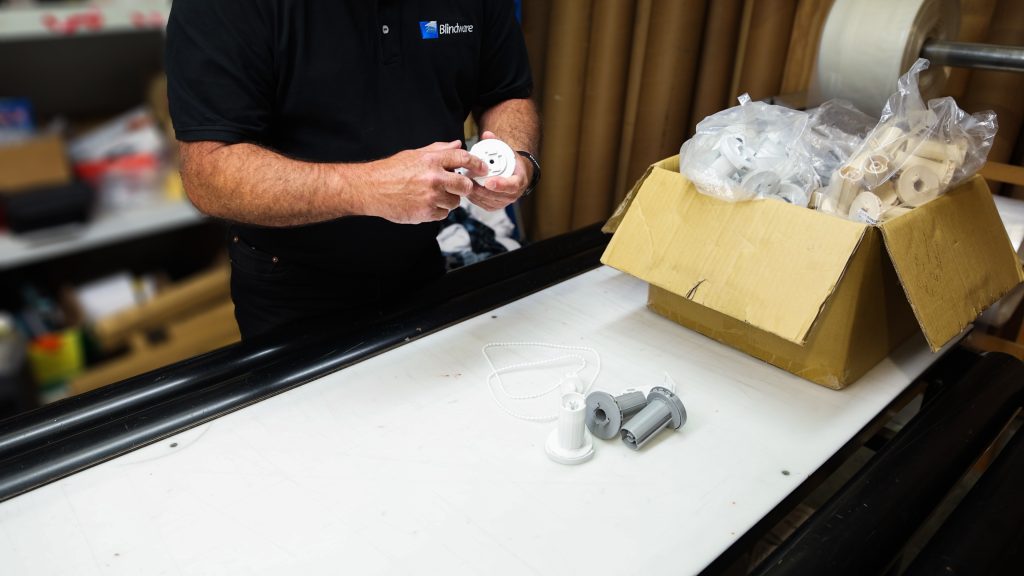
“The pandemic also brought about an interesting challenge for many in the industry. Supply shortages and longer delivery cycles for imported finished window coverings meant there was rapid expansion in locally produced blinds, curtains and even shutters. That meant Australian manufacturers had to scale quickly to cope with this sudden new demand. It also meant that local suppliers were increasingly challenged, due to the global supply chain issues, such as container shortages, rapidly rising product costs, exponentially higher shipping costs and sometimes even supplier closures.
“Blindware, like many, had to stay nimble. Despite all the challenges thrown up by COVID-19, Blindware managed to maintain inventory levels throughout the past two years and help Australian blind makers keep up with the extraordinary demands entailed. As an Australian business supporting Australian manufacturing, Blindware is uniquely placed to evolve quickly based on market needs. Australian manufacturing remains strong when the market has adequate resources and competitive pricing. The Australian based Blindware team are proud to contribute both.”
Ricky Richards
“Nine years ago, the team at Ricky Richards reached out to Wax Converters Textiles to create Barrington, a canvas collection with its roots in Australian design and manufacturing, from inception to creation,” National Head of Sales, Darren Best tells WFA.
“We saw a gap in the market; the creation of Barrington opened the door to working with our long-standing partners at Wax Converter Textiles to produce premium Australian Made canvas. We jumped at the opportunity to create Barrington, and the rest is history.”
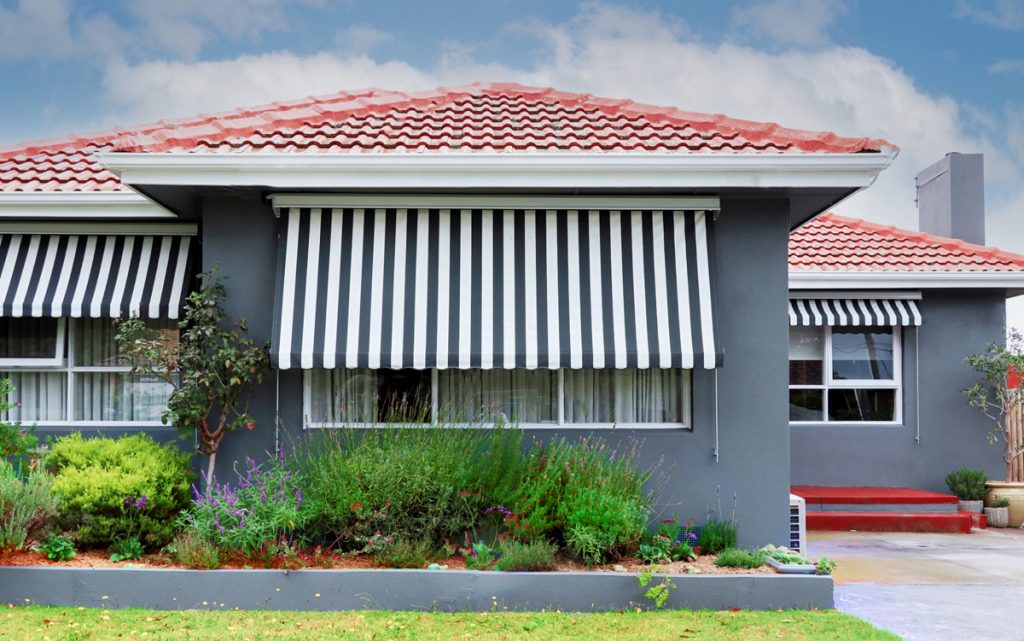
The Barrington Collection brings style and modern flair to the forefront, while continuing to highlight traditional aesthetics at the core of its design. With over 40 colour and design options, this 100% Australian Made poly/cotton canvas features three core ranges:
1. Colours: Think block colours in bold hues. This textile features the same colourway front and back, four of which are directly inspired by Colorbond.
2. Artisan: Standout striped designs feature a minimal grey backing for the edgy consumer.
3. Jubilee: An ode to heritage with classic striped designs and a traditional green back.
“As a textiles supplier, we pride ourselves on understanding the importance of trends,” Best says. “Our textiles complement annual trends set by design bodies, ensuring our customers and the end-consumer have everything they need.”
“In addition to our wide range of colours and designs, Barrington’s features and benefits include up to 95% reduction in solar heat gain to assist with indoor climate control. It also utilises Bio-UltraShield technology, a protective fabric coating which ensures colour vibrancy through UV stabilisers while providing resistance against bacterial growth, mould, and mildew. Durable and easy-to-care for, Barrington is supported by a full 10-year warranty, because Ricky believes in the longevity of this product.”
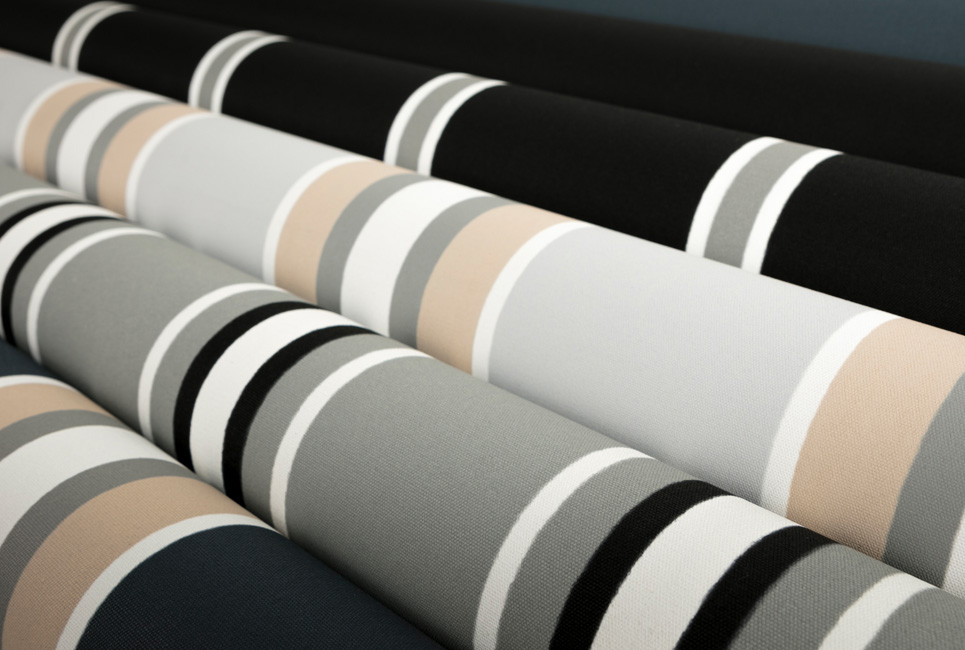
Supporting Australian business goes beyond working with Wax Converters Textiles to create Barrington and is supported by the company’s mission to supply premium-quality textiles to Aussie businesses across the nation, says Best.
“Our stance on stock holdings always ensures we can meet customer demands with supply, supporting long-standing business relationships and collaboration, while encouraging the continued growth of home-grown manufacturing industries.”
“Purchasing Barrington also supports Melanoma Institute Australia, a percentage of sales is donated to fund vital research and support their goal of zero deaths from melanoma. Blinds and awnings that look just as good as they make you feel – what more could your customer want?”
Ozroll
Ozroll General Manager Jack McDonald tells WFA the company’s engagement in the market for locally produced plantation shutters from its Queensland facility for nearly seven years has paid off in recent times.
“It took time to learn the craft. It’s quite a detailed and labour intensive product to fabricate. Coincidentally, it was part of a longer term plan to expand in 2020 – little did we know the pandemic was about to hit, which was a gift and a curse.
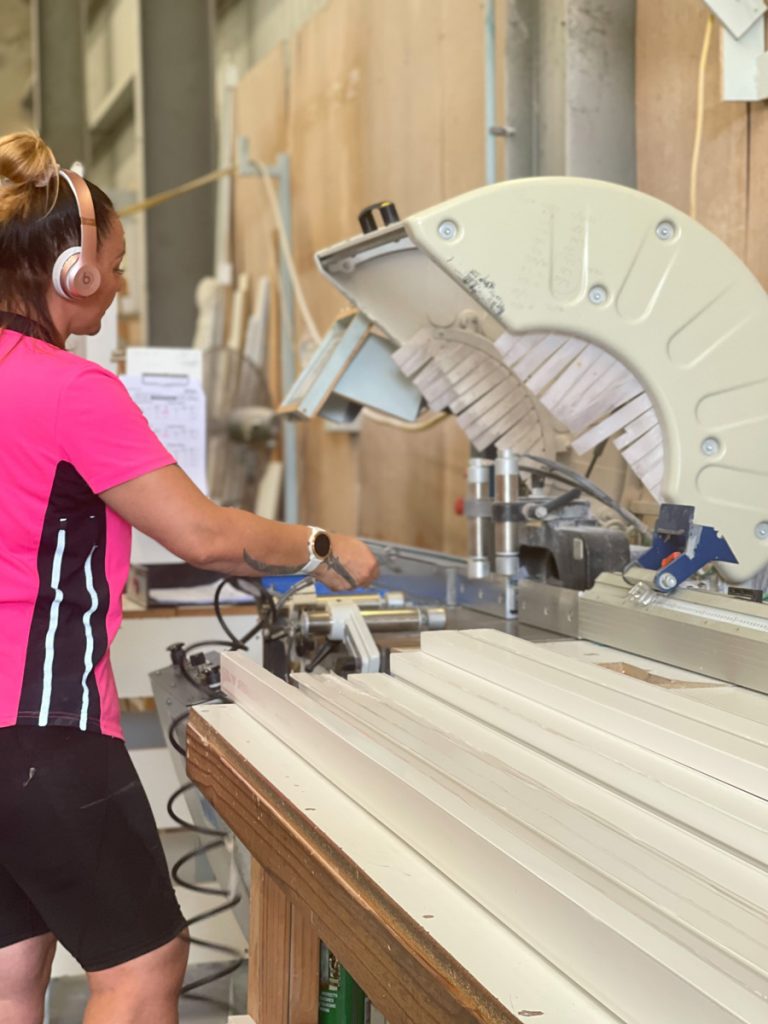
“All of a sudden our imported competitors were out to as long as 12-14 weeks lead times, with their suppliers in lockdown or their orders stuck on the water. The Ozroll ethos with all products is to make a high quality product, as fast as possible, and plantations are no different. We have always committed to a three week turnaround (or less) and with demand increasing exponentially during that time, it was one of those ‘good problems to have.”
“Because we took a crawl-walk-run approach to the division, we were prepared in terms of systems and technical expertise. But we had to act fast to expand our production area, add new equipment, and employ as well as train new people. It’s all about the people! It’s one thing to increase our output, but to do it without sacrificing quality meant we had to heavily invest in our skills base.
“In an area that includes everything from entry level to trade level roles, we currently have over 40 people employed with different levels of experience. Nearly 25% of them are completing some form of formal training through the business – generally these are supervisors or team leaders. That group of people is responsible for training others, while driving safety, quality and quotas. It’s a very diverse group on the factory floor and we love that.”
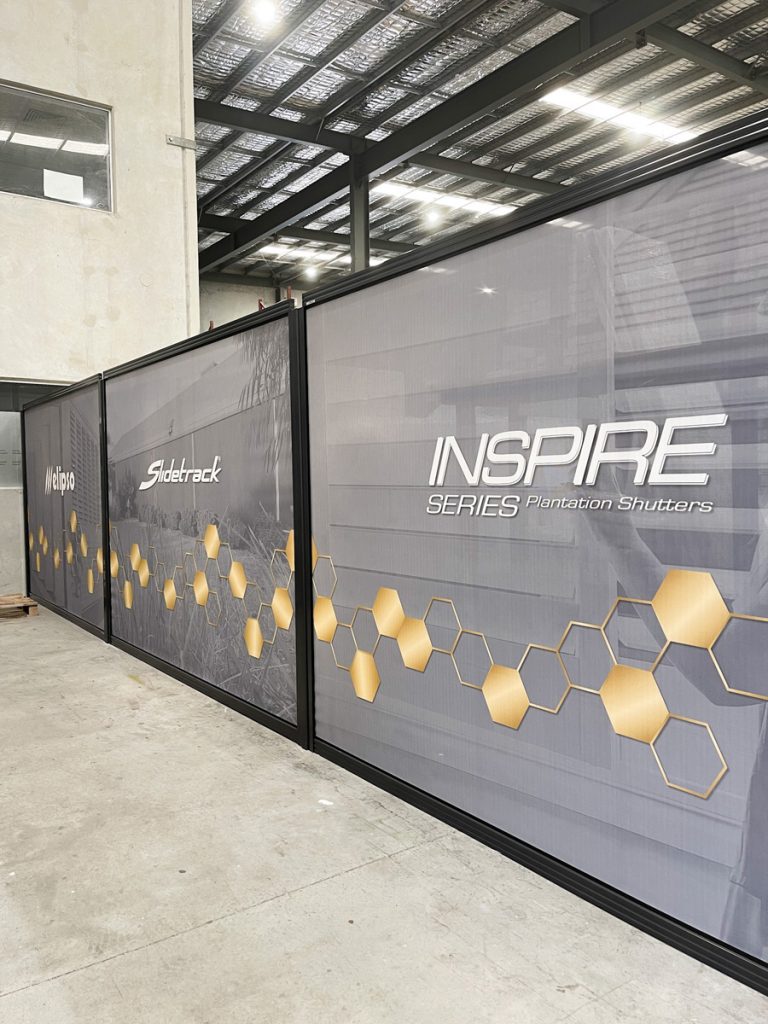
He says that even when unemployment levels were at record lows, the company still managed to find new staff through referrals from current staff, and it takes it as a compliment that people invite their friends or family to work at Ozroll.
“We’ve become very good at finding the strengths in each individual and one of the most exciting parts of my job is watching them reach their personal goals, which is of course a part of us reaching our business goals. In 2022 we reached 1000 panel output in a single week, for the first time, after having averaged closer to 800 per week in 2021.”
That’s a milestone Ozroll hopes to exceed in 2023 as it moves into a new purpose-built facility during January as part of a division expansion.
“And this is just one of three divisions of the Ozroll Queensland business – we also have aluminium louvres and Slidetrack outdoor blinds – so our overall capacity for distribution is in excess of 1400 per week – all products combined.”
Blinds by Peter Meyer
Blinds by Peter Meyer manufactures everything in-house for the trade and has been doing so since 1987, as Managing Director Simon Meyer confirms.
“We manufacture everything from fabric blinds that include Roller, Roman, Panel and Skylight blinds; to our poly Venetians, custom and pre-painted Timber Venetians and our exclusive ranges of blinds such as, our Simply Natural Woven blinds collection that includes our famous Urban Weave blinds; plus our gorgeous Shangri-la Sheer Shading blinds.”
“We manufacture Somfy Glydea motorised curtain tracks and Silent Gliss premium curtain tracks and Roller blinds, along with Solare Teknica exterior roller blinds. We also have a very strong partnership with Somfy that allows us to motorise any of our products in-house. With incredibly low staff turnover – many with us for 15-25 years – our labour force is very highly skilled in all aspects of curtain track, blinds and awnings manufacturing.
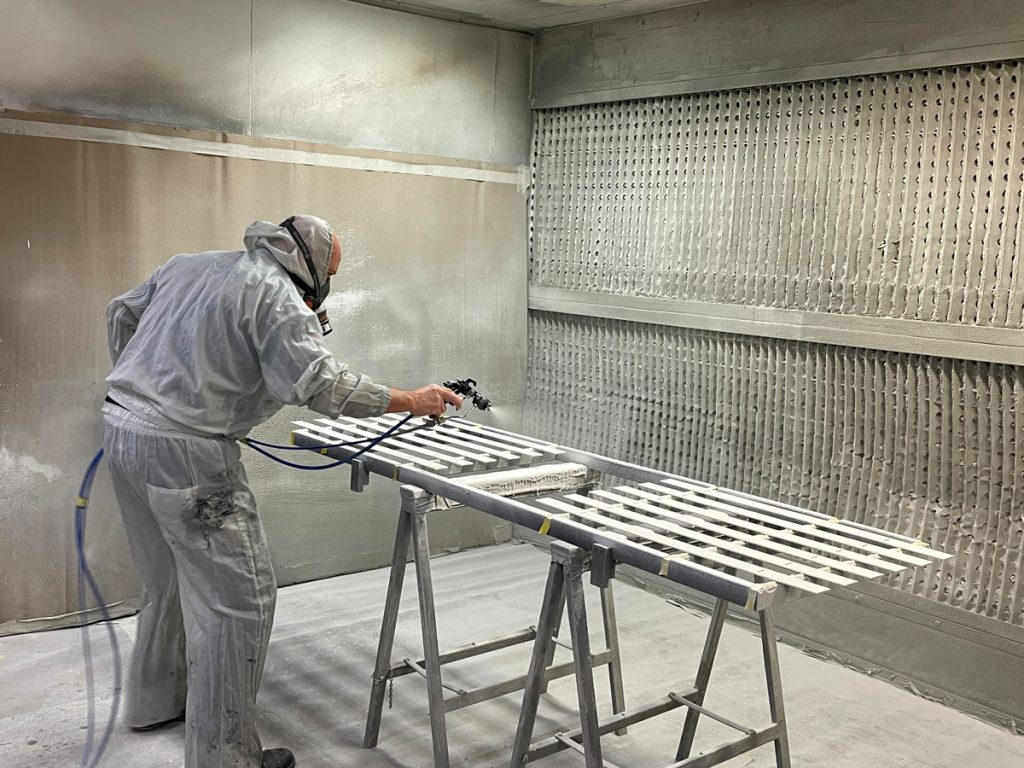
“With this skill, knowledge and our local facilities, we are able to offer more customised products than most. For example, our custom painted or custom stained Cedar Venetians and Natural Woven blinds have a very clean finish due to our highly trained staff and on-site spray painting booths.”
“This offering is particularly important now considering that we are one of the last remaining manufacturers in Australia to produce locally custom made and custom painted cedar Venetians. Our custom painting capabilities also allow us to custom paint the tubes on our Roman blinds or include matching buttons or acorns on our Timber Venetians.
The pandemic has certainly seen the Australian Made product market grow. However Meyer predicts the market is starting to see demand roll back to pre-pandemic levels.
“At the same time, we have definitely seen an increase in Roman blind sales, in particular our Urban Weave Roman blinds that have had a massive resurgence. Since entering the curtain track market following our partnership with Silent Gliss, we have also seen a large increase in sales due to a number of reasons including market growth, trend popularity and an increase in trust of our ability to manufacture Silent Gliss tracks. We have also expanded the range to include premium roller blinds, new Metropole – 30mm curtain rods and brand new curtain track profiles.
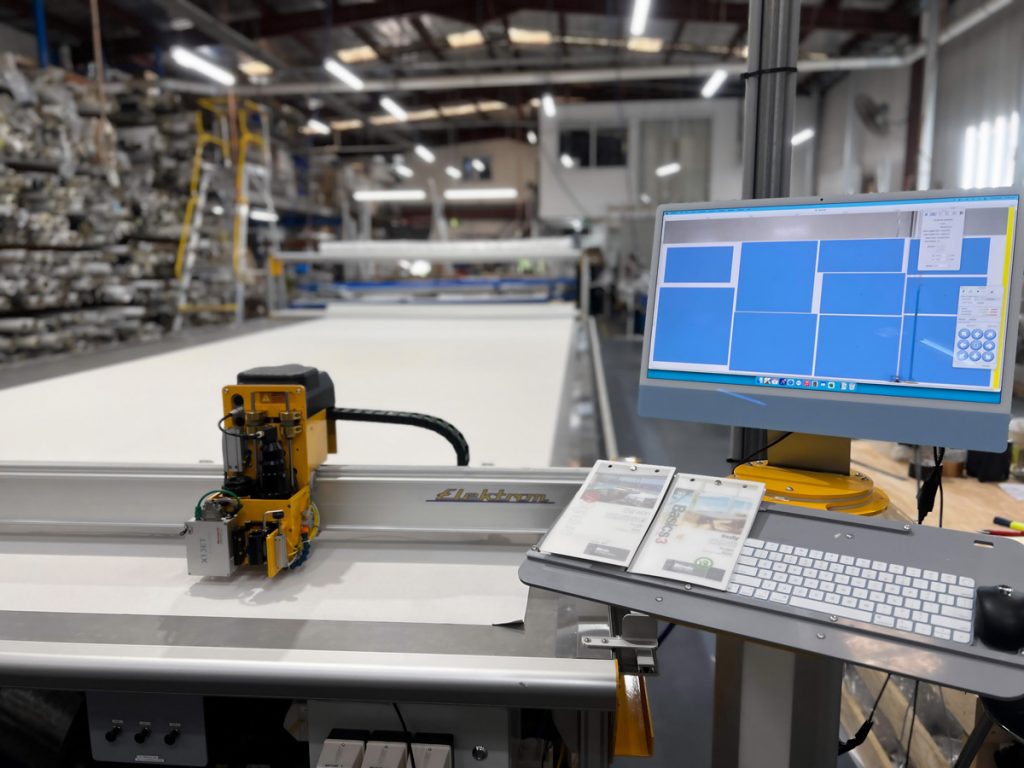
Meyer tells WFA there has been a decrease in desire for imported products due to the impact of the pandemic on international delivery timeframes as well as a shift in consumer sentiment.
“The only imported products we offer are the German manufactured Weinor exterior products and our Simply Cell range – both from regions still commanding consumer confidence.”
The company has made large investments into local manufacturing this year because in the belief that as a local Australian manufacturer, it needs to increase its quality and lead times to continue to be competitive against imported products.
“Our most substantial investment was in our new XY plotting table for cutting fabrics,” Meyer confirms. “This has significantly sped up our production allowing us to tackle larger volume commercial projects. We have also invested in the expansion of our local Homebush factory, along with some restructuring of our manufacturing processes to accommodate the growth we have seen over the past few years.”
“Competing on price is always difficult – especially now with the increases on the cost of raw materials post pandemic, the cost of manufacturing in Sydney vs the remainder of the country and the cost of transport. Getting goods around the country is on an ever increasing upward spiral in terms of costs.”
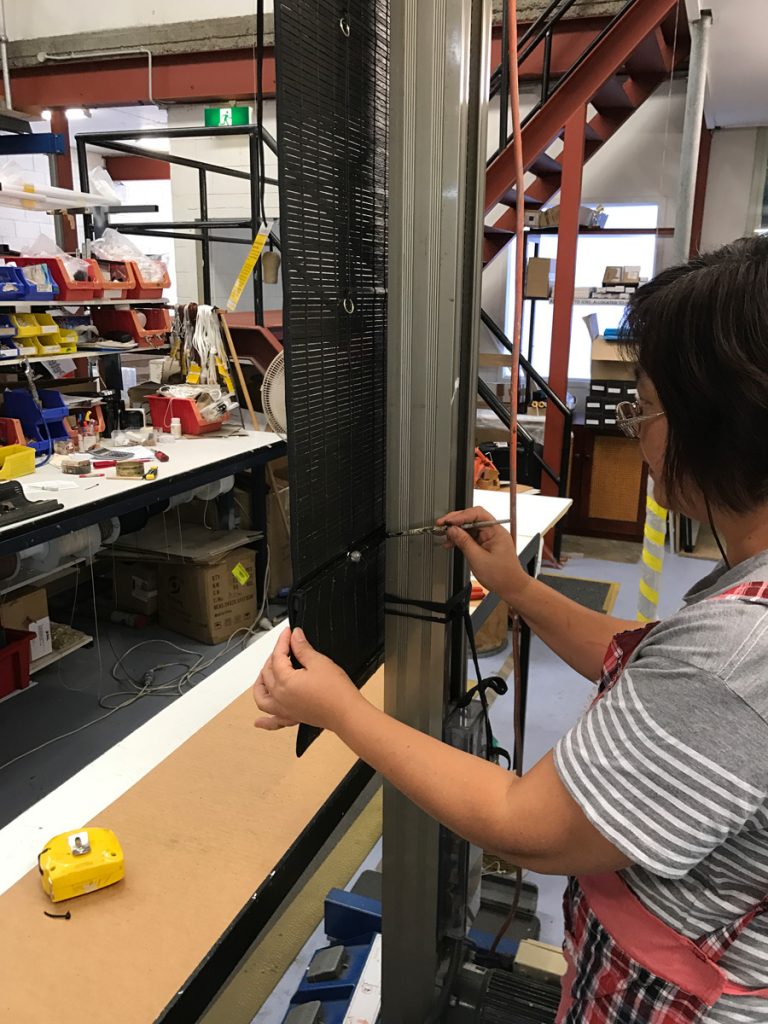
“However, we believe the biggest challenge is finding skilled workers that still want to make blinds and awnings. We are lucky in that we have a very low turnover of staff; however, it creates a challenge in our succession planning. Employers are struggling to find people with the skillset to fill the niche roles within our industry. This has resulted in some leaders exploring new and inventive ways of finding staff from various government programs.
“We are lucky our workforce has been with us for quite some time. Aside from this we have any new office staff sit with one of our experienced staff members to ensure knowledge is passed on.
The increased desire to support locally manufactured products and jobs will continue, however, we will still need to compete on efficiency and price.”
BM Blinds
Michelle Macready, Sales Manager at BM Blinds, confirms the company offers a range of accredited Australian Made blinds manufactured at its facility in northwestern NSW. This includes roller, vertical, panel glides and Veri Shades.
“With sales steadily increasing over the past two and a half years, it has been necessary for us to increase our production area to accommodate the growth. More recently, we have had to double our Veri Shade production capability to keep up with the increased demand for this product. BM Blinds is keen to invest in our local manufacturing facility as we benefit from our focus and commitment to quality and customer service.
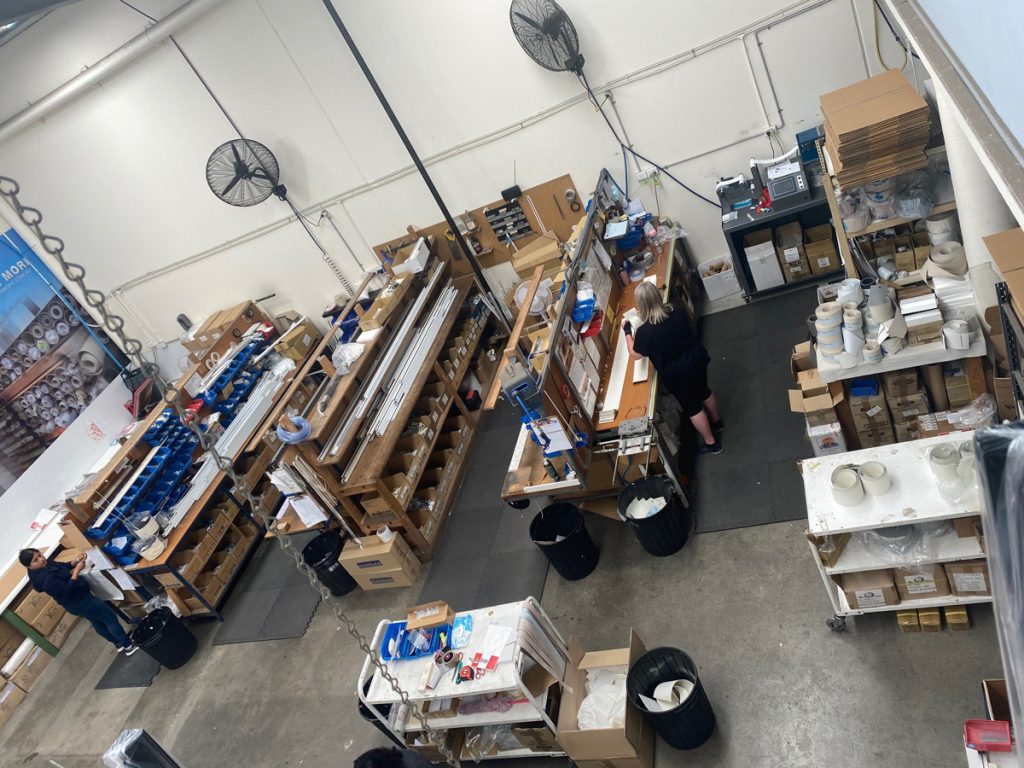
“The last two years during the COVID-19 pandemic, have demonstrated the ideal position that Australia as an island nation holds. Consumers have become more aware of the importance of buying items that are locally made as imports became impeded by flight restrictions and shipping delays. These are still having an impact, with shipping ports overwhelmed and ongoing staffing issues.
“As Australian manufacturing was highlighted in the media, there was a sense of pride for the hard work the window furnishing industry contributes to Australian jobs while other sectors became redundant as entire industries went into lockdown.
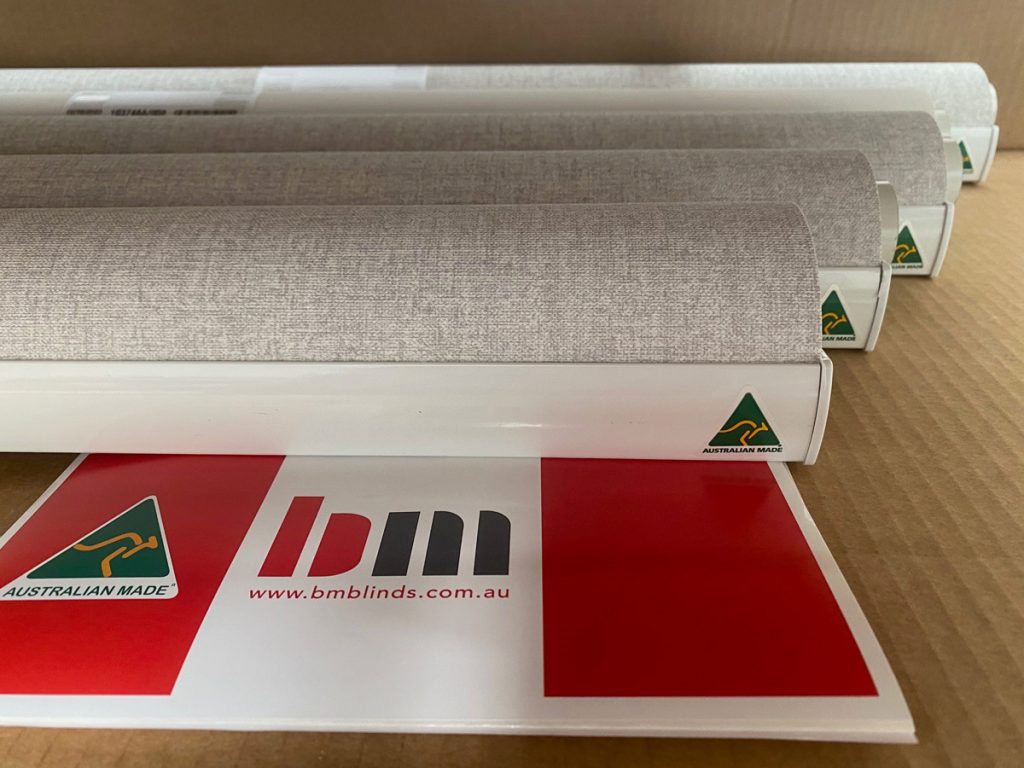
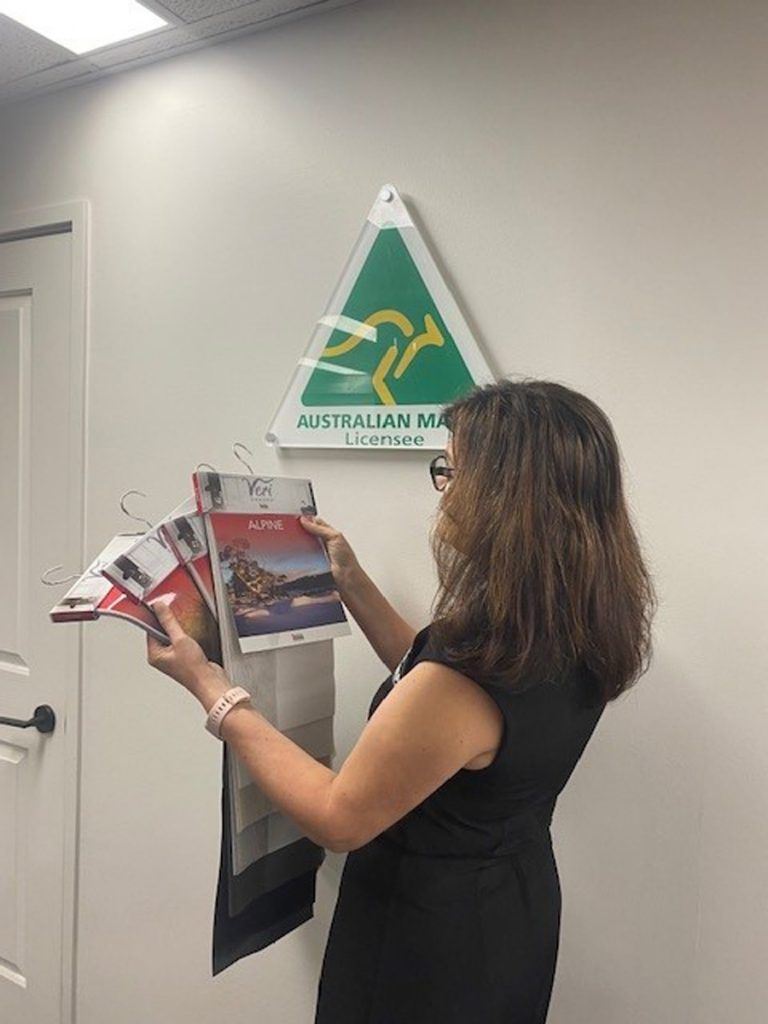
“For BM Blinds, it was a chance to consolidate staffing numbers, and this has resulted in an experienced, hardworking team dedicated to our core values of quality, service, and excellence. The challenge we now face is that as sales increase, we will be looking to hire additional production staff that can meet and exceed our expectations for attention to detail and exceptional workmanship. Training staff while juggling increased sales volumes can be tricky. At BM Blinds we have devised a buddy system ensuring that experienced staff are checking work done by newer members.”
“Being an Australian owned family business, selling to other family-owned businesses, we partner with our customer to ensure a mutually beneficial relationship that stands the test of time. As we embark on another year in business, we draw on the knowledge of the past 35 years.
“Having not only survived but thrived over the past two and a half years, it’s exciting to see what 2023 has in store as we are now confidently living with COVID-19. It’s always a balance of looking forever forward to see what changes are anticipated within the industry and keep abreast of the ever-changing world.”
MYT Shutters
Since the start of 2021 MYT Shutters has opened its doors of its local manufacturing facilities located in Seven Hills, Sydney.
“Here we produce our top of the line, Australian Made polymer shutter,” Global Sales Director: Scott Sloan tells WFA.
“Because of the MYT’s patented Aluminium core, it is the most dimensionally stable shutter panel in the locally made market with incredible durability and a relatively light weight. Whilst our 21-28 day lead times are very good, we didn’t set out to create fast shutters, rather to create the highest quality, locally made shutters out there.”
“In our facility we have over 10 different machines, including custom CNC machines built by MYT’s own engineering team, which bypasses the inaccuracies common for standard processes and other mass-produced machines.
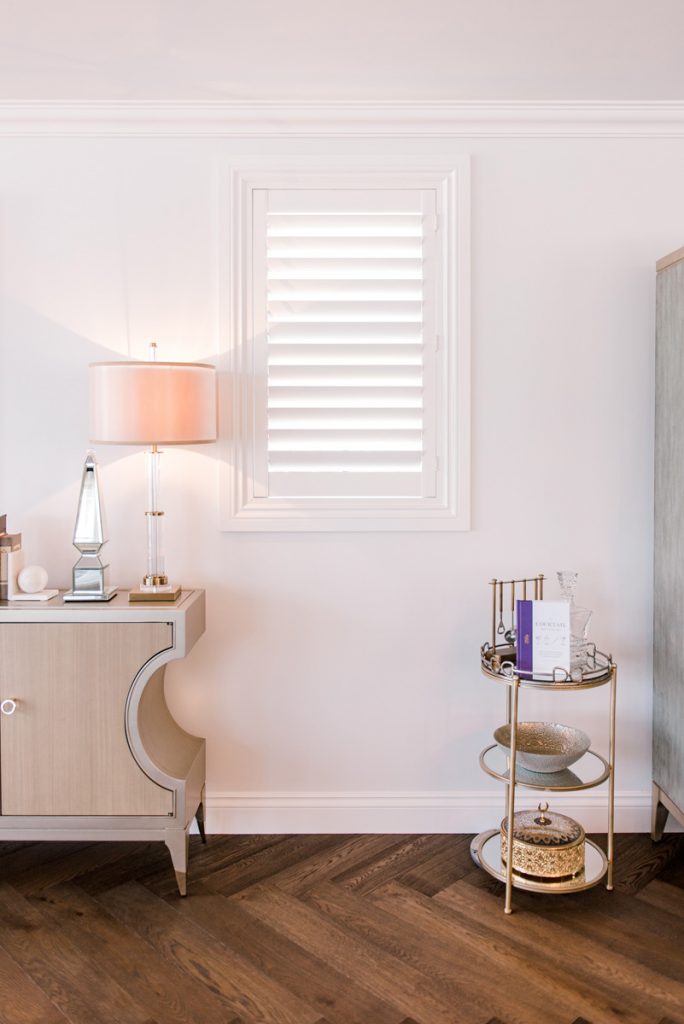
“This state-of-the-art machinery will process a complete set of left and right side stiles doing not only the mortice for the top and bottom rails, but also the midrail mortice, along with drilling the blade holes, the blade tension screw holes, the assembly holes and even the hinge placement holes, which are positioned evenly and done with CNC accuracy.”
“Any installer will tell you the CNC placed hinge holes are a huge advantage during installation, as it saves them a lot of time by eliminating the need to adjust the hinges to bring panels and frames in line with each other.
“Other methods are usually done manually, measured by hand and marked by pencil, whilst other manufacturers do not install all the hinges at all, just to save time in the production process. Precision and quality are what we constantly strive for at our local factory, and if we can make the installer’s lives easier in the process, well that’s a beautiful thing.”
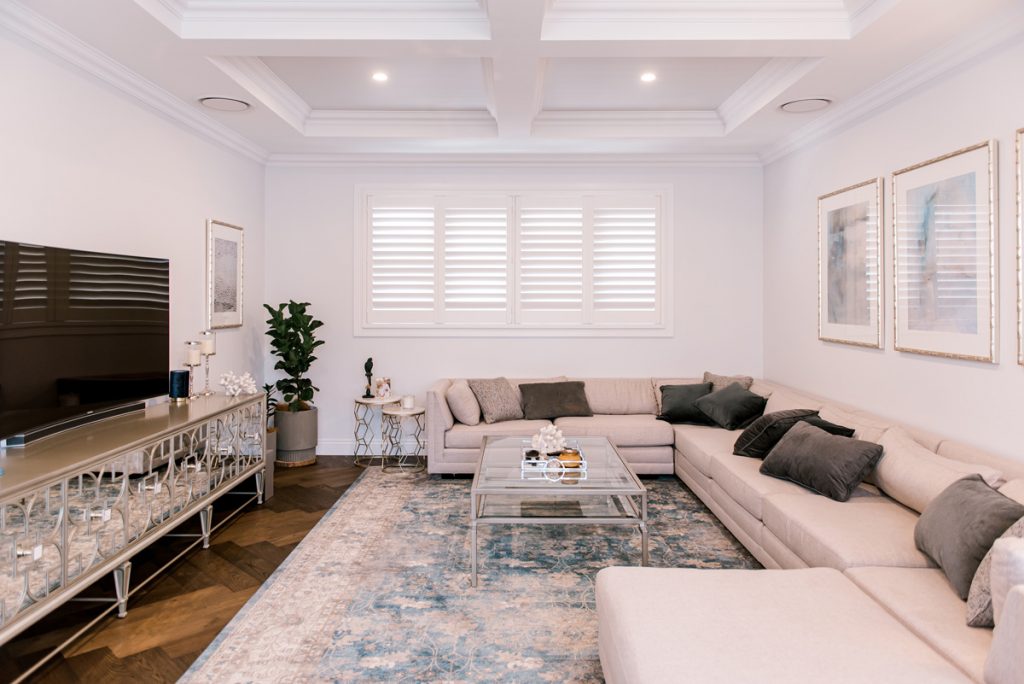
“Since we’ve opened our doors, we’ve grown our local manufacturing capacity despite the pandemic. We’ve noticed a shifting trend for people’s increased desires for locally manufactured shutters. It started with the post pandemic shipping costs going through the roof for imports, to people even becoming disgruntled with China and wanting to support local companies. The pandemic really raised awareness in people, from one’s own mental and physical wellbeing to awareness at a community level.
“When travel restrictions were imposed, we saw an immense increase in people investing in their homes. Being in lockdown for months enabled people to save money that they would otherwise spent on entertainment or travel, which could now be spent on home improvements.
“As sales continue to be steady, we do face other challenges coming out of the pandemic, which seems to be the trend internationally. Recruitment and staff shortages create a major challenge for businesses to overcome; it affects the overall turnaround times for the Australian Made products. Finding skilled workers has been quite difficult, even leading up to the pandemic. There is a shortage of people and a growing amount of job openings requiring people with a particular skill. We hope this will change as we return to normalcy in the world. At our local manufacturing facility we offer all our staff very hands-on and up-close training. Training usually starts in non-critical areas of production, and progresses whenever that individual is comfortable and ready to take on more.
“We believe the future is looking bright for local manufacturers. With manufacturing costs increasing in places such as China, and people’s awareness increasing that locally made is supporting the community and also greatly reduces waiting time, trends are shifting.”